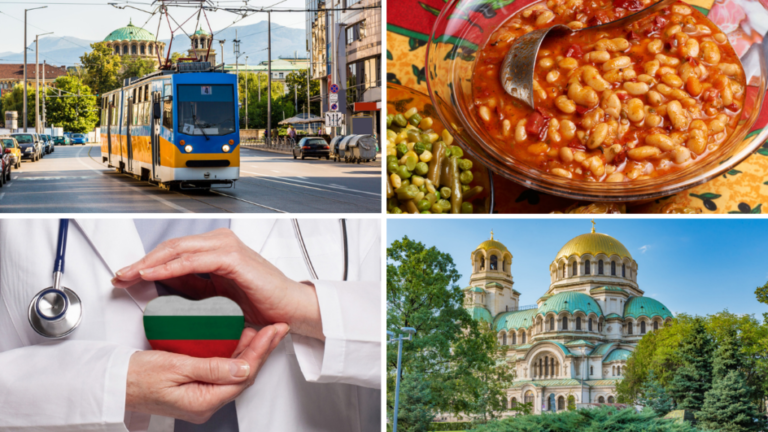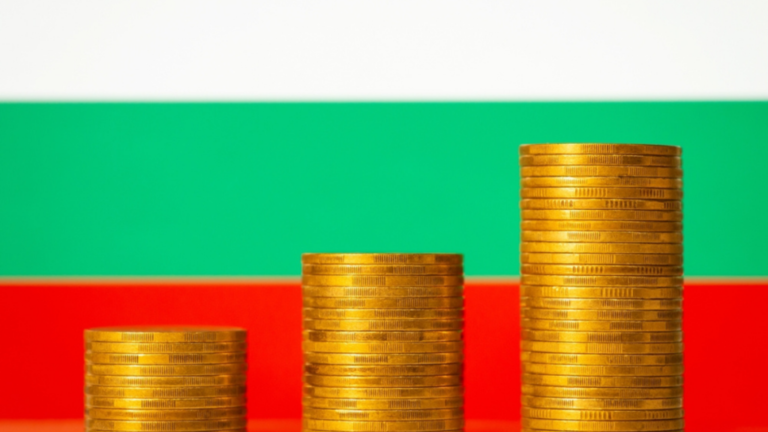Cost of living in Bulgaria: Food, transport, and more
Cost of living in Bulgaria: discover expenses, lifestyle and why this European country is considered one of the most affordable places to live.
Is Bulgaria on your goals for 2025, but you don’t know the cost of living there? Don’t worry, we’ve gathered all the information you’ll need to start your life or spend time in this European country.
Living in Bulgaria means not only changing your lifestyle, but also adapting to the costs of every essential factor of settling there. So here we’ll show how much you’ll spend on different accommodation types, health, Bulgarian basic food basket and available transport.
You’ll also find values and tips about internet connection for home and mobile. Finally, you’ll choose the plan you like most for leisure and discover the overall cost of living in Bulgaria, known as one of Europe’s most affordable countries.
Average accommodation costs in Bulgaria
To help you understand the budget you need for staying in Bulgaria, we selected the main two cities: Sofia and Plovdiv, plus Varna and Burgas, where housing costs can be similar or slightly lower than in bigger urban areas.
Based on these cities, we researched the cost of different accommodation types like hotels, furnished rooms and apartments, even renting through Airbnb. Values are approximate and updated for 2025.
| Accommodation type / City | Sofia (capital) | Plovdiv | Varna | Burgas |
| 3-star hotels per night | $60 (€55) | $50 (€46) | $55 (€51) | $48 (€44) |
| Furnished apartments monthly | $750 (€690) | $620 (€570) | $600 (€552) | $580 (€534) |
| Furnished rooms monthly | $400 (€368) | $330 (€304) | $320 (€294) | $300 (€276) |
| Airbnb per night | $45 (€41) | $40 (€37) | $42 (€39) | $38 (€35) |
These costs can change due to national economy, but mainly because of space, size and location of each property.
Especially, keep in mind that a furnished apartment in Sofia, the capital, is more expensive since lifestyle there is higher than other cities.
Other aspects include extra services often offered by hotels or Airbnb rentals, such as coworking spaces, leisure rooms, social lounges, laundry, cleaning and food, which increase accommodation costs.
Cost of food
Surely, your diet will change slightly once you start living in Bulgaria. However, you can adapt progressively, especially regarding product costs, as they vary according to your consumption habits and the nutrition you usually follow.
We selected some typical Bulgarian basic basket products so you’ll know their prices.
To guide you better, we chose a local supermarket like Lidl, popular for its variety of products. However, in Bulgaria people also buy vegetables, dairy or meat in street markets. Here are the prices you can expect:
- Milk 1 L: $1.40 (€1.30)
- White bread 550 g: $1.20 (€1.10)
- Rice: $2.11 (€2.00)
- Eggs dozen: $3.20 (€2.95)
- Chicken 1 kg: $5.50 (€4.50)
- Beef 1 kg: $9.20 (€8.45)
- Cheese 1 kg: $10 (€9.00)
- Coffee 250 g: $5.00 (€4.60)
- Bottle of wine: $0.70 (€0.60)
- Fruit and vegetables: $10-12 (€9-11)
- Personal care products: $7-10 (€6.50-9)
- Household cleaning products: $11 (€10)
If you sometimes prefer having breakfast, lunch or dinner outside, we’ve also gathered the costs of each traditional daily meal in mid-range restaurants in Bulgaria. This way, you’ll have broader information about food in Bulgaria:
- Breakfast (banitsa, mekitsa, princesses with drink): $5-9 (€4.50-8.50).
- Lunch (salad, soup or sarmi, kebapche with drink): $8-15 (€7-14).
- Dinner (grill with sides, kavarma, gyuveche, meshana skara and dessert): $15-20 (€14-19).
Transport prices in Bulgaria
In Bulgaria you have different transport options, most of them public. In cities outside the capital, buses and trams prevail. Sofia, especially, has the most complete and efficient transport system in the country.
You can also ride a bike, though it’s mainly recommended for leisure trips, since city infrastructure isn’t fully adapted for bicycles. Still, here’s the cost of a monthly subscription with Nextbike in Bulgaria.
- Urban buses, metro and trams in Sofia: From $0.95 (€0.88) for a single ticket, up to $30 (€28) for a monthly pass.
- Panoramic trains in Tesnolineika: Journeys last 5 hours on a 125 km daily route. Cost per trip is $4 (€3).
- Taxis: Services use apps like Yellow Taxi and TaxiMe. The average fare per kilometre is $1.10 (€1).
- Bolt: A private ride-hailing app offering economic and premium rides. Prices vary by category and demand.
Other expenses worth noting about Bulgarian transport include buying a car. This means paying insurance, fuel or electricity, depending on the vehicle you choose.
Here are the basic costs of owning a car like the Renault Clio Hybrid e-Tech, which according to Best Selling Car Blog, was the most purchased in early 2025 for about $27,000 (€25,000), representing the highest range of this model.
- Mandatory car insurance: Annual cost $300 (€285).
- Petrol per gallon: About $6.30 (€5.80).
- Public charging kWh (standard): $0.26 (€0.24).
- Public charging kWh (fast): $0.31 (€0.29).
- Home charging kWh: $0.159 (€0.122).
Healthcare costs
In Bulgaria you’ll find a healthcare system divided into a public sector managed by the State and a private one, the latter being more expensive for medical services.
To access the public healthcare system, you must hold a defined migration status and/or work in Bulgaria. This way you can contribute to the National Health Insurance Fund (NHIF).
If you don’t meet the requirements for Bulgarian public healthcare, you’ll need a medical insurance, which is mandatory to enter the country. It must offer minimum coverage of $30,000 (€30,000) and may cost around $600 (€550).
Having insurance lets you access both healthcare sectors. Moreover, you won’t face high expenses for emergencies, hospitalisation or check-ups.
Here are some average medical service and medicine costs you’d pay without insurance coverage:
- General practitioner consultation: $30 (€28).
- Specialist consultation: $22-44 (€20-40), depending on speciality.
- Dentist consultation: $40 (€38).
- Hospitalisation per day in public hospital: $0.55 (€0.55).
- Hospitalisation per day in private hospital: $43-100 (€40-100).
- Psychology session: public sector costs about $3-4 (€2-3).
- Over-the-counter medicines in Bulgaria
- Paracetamol (20 tablets): $2.50 (€2.30).
- Ibuprofen (20 tablets): $3 (€2.75).
- Antihistamines: $6 (€5.50).
- Aspirin: $2 (€1.85).

Internet and call plan prices
Without internet you won’t manage many daily tasks in Bulgaria. At least, you’ll need it for news, navigation during your first months or booking a taxi app. So here are three providers offering home internet with their speeds and prices.
| Mobile operator | Speed | Cost |
| Vivacom | 600 Mbps / 400 Mbps | $18-28 (€17-26) |
| Yettel | 300 Mbps / 50 Mbps | $20 (€19) |
| A1: | 75 Mbps / 45 Mbps | $8 (€7) |
Meanwhile, for mobile phone services, the same providers offer from 15 GB up to unlimited data in mid-range plans. Here are their prices:
| Mobile operator | Plans | Cost |
| Vivacom | Unlimited data in Bulgaria plus up to 17,200 MB for EU countries. | $17 (€15) |
| Yettel | Postpaid plan (Drivey 4G) | $16 (€15) |
| A1: | 15 GB plus 300 minutes and 300 SMS. | $12 (€11) |
Holafly also offers monthly subscription plans with coverage in over 160 countries, allowing unlimited data sharing with other devices. You can choose from 25 GB to unlimited data and even set it up before travelling, so when you arrive in Bulgaria you just turn it on and start browsing instantly.
If your stay is short, you can choose the Holafly Bulgaria eSIM. With it you’ll have unlimited data for the days you need. This option, just like the plans, won’t generate roaming costs and doesn’t require changing your SIM card.
Important: If you are a frequent traveler and want to stay connected without worrying about expensive roaming or looking for a new SIM at every destination, Holafly’s subscription plans are for you. With a single eSIM, enjoy internet in more than 160 countries for a fixed price and no surprises on your bill. Travel without limits and connect easily and securely! 🚀🌍

Leisure and entertainment costs in Bulgaria
Of course, not all living costs in Bulgaria focus only on healthcare, transport, housing and food. We know leisure activities matter for socialising, meeting new friends or even finding work if needed.
So, we added approximate prices of activities you can do while in Bulgaria. We also thought about those days when you’d rather stay home watching Netflix, Amazon or HBO, or listening to Spotify and YouTube Premium.
- Visiting Alexander Nevsky Cathedral in Sofia is free.
- Walking around Plovdiv’s old town is free.
- Visiting the Roman Amphitheatre in Plovdiv costs $5 (€4.60).
- Exploring the Naval Museum in Varna costs $4 (€3.70).
- A day of kayaking on Kamchia River in Varna: $78 (€72).
- Netflix subscription per month: $9 (€8).
- HBO and Amazon subscription per month: $15.90 (€14.70).
- Cinema ticket can cost $7 (€6.45).
- Spotify monthly subscription: $5 (€4).
- YouTube Premium monthly subscription: $7 (€6).

The cost of living in Bulgaria, as mentioned at the beginning of this guide, is significantly cheaper than in other European cities.
You’ll enjoy living in a good place, reliable healthcare coverage and comfortable, efficient and low-cost transport options. That’s what this destination in Europe offers you.
On the other hand, food is another advantage since grocery prices aren’t high either for singles or families with an average Bulgarian salary.
Finally, average monthly expenses in any Bulgarian city range between $1,100-1,400 (€1,000-1,200). Keep in mind that the average 2025 salary in Bulgaria is about $1,500 (€1,400) monthly in main cities.
Frequently asked questions about the cost of living in Bulgaria
Generally, all Bulgarian cities are cheaper to live in than in other European countries. However, Sofia, the capital, has the highest living costs.
Bulgaria uses the country’s official currency, the Bulgarian lev.
During 2025 you can’t pay in euros. However, starting in 2026, Bulgaria’s Government and the European Union agreed to adopt the euro for everyday commercial transactions.
Bulgaria has very low crime rates compared to other European countries. Walking at night in many areas isn’t considered dangerous. Still, we recommend taking basic precautions.
Plovdiv offers many benefits for living. It’s the second most important city in Bulgaria, yet its costs are much lower than Sofia, the capital.





 Language
Language 


















 No results found
No results found


